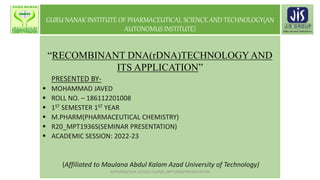
RECOMBINANT-DNA ppt.pptx
- 1. GURU NANAK INSTITUTE OF PHARMACEUTICAL SCIENCE AND TECHNOLOGY(AN AUTONOMUS INSTITUTE) “RECOMBINANT DNA(rDNA)TECHNOLOGYAND ITS APPLICATION” PRESENTED BY- MOHAMMAD JAVED ROLL NO. – 186112201008 1ST SEMESTER 1ST YEAR M.PHARM(PHARMACEUTICAL CHEMISTRY) R20_MPT1936S(SEMINAR PRESENTATION) ACADEMIC SESSION: 2022-23 (Affiliated to Maulana Abdul Kalam Azad University of Technology) M.PHARM/SEM 1/(2022-23)/R20_MPT1936S/PRESENTATION
- 2. CONTENT 1. INTRODUCTION 2. GOALS OF rDNA 3. ENZYME USED IN rDNA TECHNOLOGY 4. STEPS INVOLVED 5. VECTORS 6. APPLICATION 7. CONCLUSION 8. REFERENCE M.PHARM/SEM 1/(2022-23)/R20_MPT1936S/PRESENTATION
- 3. INTRODUCTION When a gene of one species is transferred to another living organism by artificial means is known as rDNA technology.[1] It is commonly know as Genetic engineering. A series of procedures used to recombine DNA segments. Under certain conditions, a recombinant DNA molecule can enter a cell and replicate. rDNA is the recent advances in biotechnology and it was developed by two scientist named Boyer and Cohen in 1973.[1] M.PHARM/SEM 1/(2022-23)/R20_MPT1936S/PRESENTATION
- 4. GOALS OF rDNA a) Gene of interest is isolated. b) To make desired alteration in one or more isolated gene. c) To return altered gene to living cell. d) Artificially synthesize new gene. e) Understanding the hereditary disease and their cure.[1][2] M.PHARM/SEM 1/(2022-23)/R20_MPT1936S/PRESENTATION
- 5. ENZYMES USED IN rDNA TECHNOLOGY • There are mainly two different types of enzymes that are helpful in rDNA technology;- • Other enzyme is Reverse Transcriptase which makes a DNA copy of RNA molecule.[2][4] RESTRICTION ENZYMES DNA LIGASE M.PHARM/SEM 1/(2022-23)/R20_MPT1936S/PRESENTATION
- 6. STEPS INVOLVED IN rDNA TECHNOLOGY 1.ISOLATION OF DNA- [2] M.PHARM/SEM 1/(2022-23)/R20_MPT1936S/PRESENTATION
- 7. 2.CUTTING AND JOINING OF DNA • DNA can be cut into large fragments by mechanical shearing.[1] • Restriction enzyme are the scissors of molecular genetics. • These enzymes recognises short segments and cut the DNA at those points. • New DNA pieces can attach to sticky ends and then DNA-LIGASE covalently bond the pieces together.[1][2] M.PHARM/SEM 1/(2022-23)/R20_MPT1936S/PRESENTATION
- 8. 3.AMPLIFICATION OF r-DNA MOLECULES • Transferring the rDNA molecule into bacterial host strain.[1] • Once in a cell, the rDNA will be replicated. • When the cell divides the replicated recombinant molecule go to both daughter cell which themselves divide later. Thus the DNA is amplified. M.PHARM/SEM 1/(2022-23)/R20_MPT1936S/PRESENTATION
- 9. VECTORS • A vector is an area of DNA that join with another DNA part without losing the limit for self- replication.[2] • It should be capable of replicating in host cell. • It should have convenient RE sites for inserting DNA of interest. • It should be small and easy to isolate. Vectors used in rDNA technology:- i) Plasmid vector. ii) Lamda phage vector. iii) Cosmid vector.[1] M.PHARM/SEM 1/(2022-23)/R20_MPT1936S/PRESENTATION
- 10. APPLICATIONS I. Molecular biology-Gene mapping.[3] II. Genetic disorder. III. Production of monoclonal antibody. IV. Gene therapy. V. DNA fingerprinting. VI. Vaccines production. VII. For Pharma product.(Artificial insulin production) VIII. Agriculture- i) Growing your own crops.(good quality) ii) Pesticide resistant crops all being grown in artificial conditions.[3][4] M.PHARM/SEM 1/(2022-23)/R20_MPT1936S/PRESENTATION
- 11. CONCLUSION Hence rDNA technology has been very beneficial in the scientific field and has been used for different purposes like in medicines, agriculture and industry. It has proven its importance in the productions of vaccines and protein therapies. rDNA has been gaining its importance over last few years and recombinant DNA will only become more important in 21st century as genetic diseases become more prevalent and agriculture area is reduced. It has help us to know the molecular basis of diseases. It has played a immense role in crime detection via DNA fingerprinting.[4] M.PHARM/SEM 1/(2022-23)/R20_MPT1936S/PRESENTATION
- 12. REFERENCE 1) Primrose, S. B., & Twyman, R. (2006). Principles of Gene Manipulation and Genomics. Wiley. 2) Glick, B. R., & Patten, C. L. (2022). Molecular Biotechnology: Principles and Applications of Recombinant DNA (ASM Books) (6th ed.). ASM Press. 3) Infoplease. (2020, July 30). Genetic Engineering: DNA Technology Applications. InfoPlease. https://www.infoplease.com/math-science/biology/genetics-evolution/genetic-engineering-dna- technology-applications. 4) Khan, S., Ullah, M. W., Siddique, R., Nabi, G., Manan, S., Yousaf, M., & Hou, H. (2016). Role of Recombinant DNA Technology to Improve Life. International Journal of Genomics, 2016, 1–14. https://doi.org/10.1155/2016/2405954. M.PHARM/SEM 1/(2022-23)/R20_MPT1936S/PRESENTATION